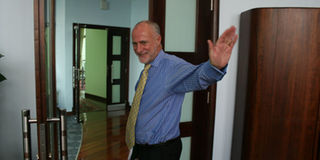Michael Joseph takes final bow

WILLIAM OERI | NATION. Succession: Kenya’s king of mobile industry Michael Joseph finally hands over the hot seat
What you need to know:
Profile - Michael Joseph
- Birth: Born in South Africa, Mr Michael Joseph aspired of becoming a game ranger or a veterinary doctor, but ended up as a telephone repairman in as a teenager in his home country. He graduated with a degree in electrical engineering from the University of Cape Town.
- Education: When he graduated from high school, his family did not have enough money to send him straight to university so he got into a technical school and ended up repairing phones for Telkom SA as an apprentice.
- He completed the compulsory army service for three years before joining engineering school. In 1986, he left South Africa at the height of the anti-apartheid campaign and went to the US.
- Career: He worked for GTE, a mobile phone operator, for 10 years starting at the bottom in the international projects team and rising to vice-president. He joined Vodafone in Hungary as chief technical officer in late 1999 after working as a private consultant for two years and joined Safaricom in 2000.
Even his critics acknowledge one thing: Michael Joseph is one hell of a manager.
Not so much because of growing Safaricom from a scrappy mobile operator 10 years ago to a market leader and money machine, but more so for his knack for doing the right thing for his firm at the wrong time for his rivals.
Mr Joseph is unarguably Kenya’s CEO of the decade, even as he leaves the most prestigious corner office on the seventh floor of Safaricom House in a matter of days.
“The mood is quite sad here,” he said recently. “Employees are a bit concerned but determined.”
The company has been preparing for the change to Mr Robert Collymore, the Vodafone choice from South Africa who takes over on November 1 in Kenya’s most-watched corporate transition. “We’ve been talking to employees for a long time,” says Mr Joseph, who will stay on an adviser to Mr Collymore and Vodacom as well as board member. “Many now feel this is a good thing.”
On this Friday afternoon, nothing betrays the impending switch at Safaricom head offices apart from guys in striped shirts and matching ties having a bite at the CEO’s boardroom. Among them are Joseph and Collymore.
The reception is empty, with an array of trophies with the bored orphaned stare. The air is heavy with the smell of a new guy around, yet it’s not a big deal for the security guard nor the secretary typing away.
Mr Joseph may not like it that the “too big shoes” metaphor has lately been thrown at him and his successor one too many times, but there are no two ways around it, even for this interview. “Physically my shoes are small. Bob has bigger shoes,” he jokes. “But his are a different kind of shoes. He can’t be Michael Joseph. He will rely on his character.”
The Michael Joseph Kenyans know is the hands-on hard worker and micro-manager. For him, no function is so big he can’t invite the lowest cadre of staff nor too small to be officiated by the CEO. It is this style and near-magical connection with the market that have built a mobile phone empire in just a decade – from 16,000 subscribers in 2000 to over 15 million.
As subscribers grew, so did revenues, topping a pretax profit of Sh20.9 billion for 2009 from revenues of Sh81 billion. Safaricom today is Africa’s eighth largest publicly listed telephone company valued at Sh250 billion on the Nairobi Stock Exchange.
It’s time for someone else
With such success, Mr Joseph’s hot seat is quite intimidating, but he says Mr Collymore has the chops for the job. “Safaricom now needs a different kind of leadership style,” he says. “I have done what I wanted to do. And it’s time for someone else. Bob is a smart guy and I don’t think he wants to say one day, ‘I’m the man who brought down Safaricom.’”
Investment and management analysts have praised the transition, which has taken nearly three months since the board announced Mr Collymore, the former chief officer for corporate affairs at Vodacom, Vodafone’s subsidiary in South Africa, would take over.
This is the opposite of what happens with Safaricom’s peer, Zain, which has had four CEOs in a turnover that matches its rebranding from Kencell, Celtel, Zain and, soon expected, to Airtel. The stability at Safaricom created the right vigour to take advantage of the weaknesses that came with management and brand changes at Parkside Towers to strengthen its brand.
Analysts say the change-over at Safaricom may not hurt growth in a major way. “The transition was done in good time,” Mr John Kirimi, the chief executive officer of Sterling Investment Bank, said. “The new guy has settled in nicely. There might be a slowing effect, but in the medium to long-term, the momentum will be maintained.”
Business is a collective effort, Mr Kirimi said, and the CEO’s exit will not kill innovation. “Yes, Joseph had good organisation capacity, but he wasn’t alone. Safaricom has a committee that drives innovation and we expect to see his successor following this trend and improving on it.”
Innovation is Safaricom’s killer punch. Aside from well-executed and at times wacky marketing and advertising, the mobile operator sets the pace for its rivals.
From per-second billing that turned the tables on Kencell’s (now Zain) per minute flat tariff, innovation peaked in 2007 with M-Pesa, the mobile money transfer service that has not only revolutionised how money changes hands but, most importantly, has turned into a huge revenue generator. In 2009, it raked in Sh7.5 billion and that figure is expected to soar.
Then there’s M-Kesho, which it launched in partnership with Equity Bank, turning the cellphone into a palm bank account.
Even in the face of a bruising price war by Zain, M-Pesa has placed handcuffs on subscribers, saving it from a mass churn to rivals with cheaper calling and texting tariffs.
But how long can this last? “This is a new market dispensation and it will test the new CEO’s genius,” said Dr Reuben Marwanga, the dean of the faculty of Information Technology at Strathmore University. “It’s going to be tough as Airtel comes in with new products as well.”
He says Safaricom’s market share of 78 per cent can only go down, he said, suggesting more innovation should go into data. “Voice has become like a commodity product,” says Dr Marwanga, who also teaches at the Strathmore Business School. “It is of course good for consumers, but it will hurt the companies, especially Safaricom.”
Mr Joseph has been shy to engage in an all out war and responded with offers to keep customers from migrating. He says the innovation spirit will live on because “there’s still new stuff out there.” “If they want to cut prices and earn less money, that’s not my problem. Safaricom will continue to be innovative because the DNA runs through the company. Who would have predicted M-Pesa four years ago?”
His critics say Joseph abused his market dominance to make lots of cash from high rates and locking-in callers by making off-net calls expensive. “That was his greatest undoing,” Dr Marwanga said. “He didn’t think of the consumer and made as much as he could from them. That’s why you are seeing people shifting to other networks now.”
But the outgoing CEO says Safaricom is a strong brand that connects with Kenyans – from products to corporate colours picked from the national flag’s dominant green and red. Branding experts describe this as clever idea, even though Essar’s yu’s attempt at borrowing big from the flag has yet to resonate.
“It’s the connectives even with landscape and the country’s beauty,” said Mr Joseph. Kencell chose pink. How would you go for such a colour in Kenya? We made our decisions and mistakes. I couldn’t have done it any better.”
Investors have been skittish about Joseph’s exit, with many seeing a fall in revenues if the new CEO does not click with the market and the transition does not cover management risks. “While discussing the exit of an incredibly successful CEO of MJ’s calibre,” says Mr Macharia Kihuro, a risk manager at Shelter Afrique, “one aspect of risk management that is interrogated revolves around institutional corporate governance. Virtuous institutions outlast capable individuals. The one-million dollar question is, ‘Was the company under MJ able to set good institutional corporate governance structures?’”
If Safaricom has aligned corporate governance with ERM (enterprise resource management) from the board level to the lowest cadre of staff, he added, the exit will not be a big headache. Another risk is that Safaricom is likely to experience a considerable drop in profitability – partly due to the changes in tariff prices and loss market share to competition.
The other is human resource as staff morale may fall and affect productivity. “However, people need to understand that such exits are always planned and executed to achieve continuity and growth,” says Mr Kihuro. “An example is that of 142 year-old Tata Group in India, which is looking for a successor to group chairman Ratan Tata, who is due to retire when he turns 75 in December 2012 as per the group retirement policy!”
The fact that Joseph will stay on, and even maintain an office at Safaricom House, is consolation for many. His parting shot is as predictable as its mobile number prefixes. “Safaricom is a great company,” he said, as he strode out for a meeting, on his second last Friday as CEO. “And it will always be the best.”




